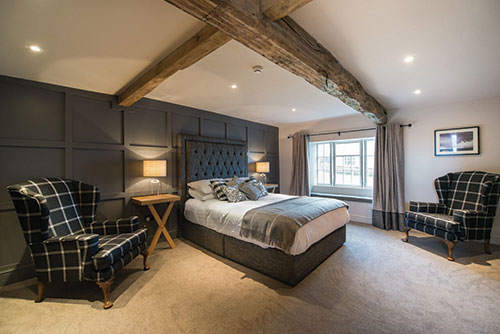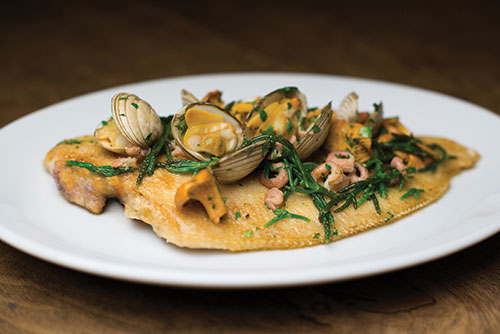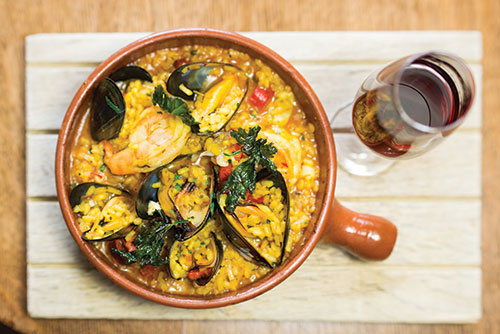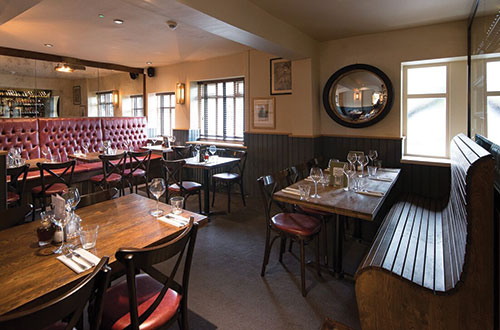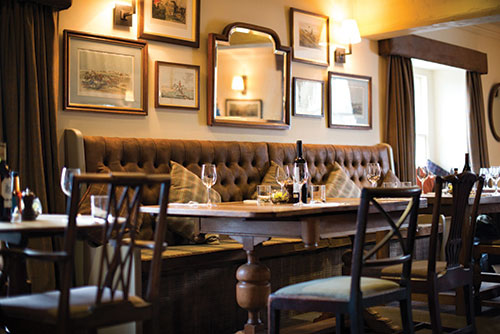The Caterer interview: Joycelyn Neve
John Porter about how she recruits her army of 'Seafood Soldiers'
Did your family background influence your career choice?
I'm from a producer/supplier family [Joycelyn's father, Chris, co-founded Fleetwood fish firm C&G Neve]. Producers tend to stick together, so the fish man is friends with the meat man and the cheese man. I grew up surrounded by fabulous produce. Before I could reach the sink, I'd be standing on a chair, cleaning mussels or scallops. I then worked through university in the kitchens, putting the food I'd grown up with onto plates.
How did you decide that you wanted to run pubs?
I'd worked in a couple of high-end restaurants, and while the food was fabulous, there was the constant struggle of what you do from Monday to Thursday. I'm a pretty informal person and I decided it was pubs I wanted to work in.
How did you move from the ambition to the reality?
I drew up a business plan. I wanted the pubs to be seafood-led as well as serving pub classics, and for them to have a seafood specials board that really was special. I registered Seafood Pub Company as a name and then began looking for sites.
When I was younger and I was working in my dad's office, I used to see invoices going to the Devonshire Pub Company, and my dad spoke very highly of Andrew McLean [the founder]. I asked dad to get me 10 minutes with him. I turned up at his house, showed him the business plan and sample menus, and he really liked them.
Assheton Arms
How did you find your first site, the Oyster & Otter at Blackburn?
We'd seen the site before we approached the owner, Daniel Thwaites. The architect that we used lived just up the road. It was a dingy boozer, but it ticked all the boxes - main road location, good motorway access and enough chimney pots around it. We knew Ribble Valley Inns had a successful site not far away, so the trade was there. I spoke to Thwaites to see what deal it would be interested in doing.
Once that first site was a success, how did you approach raising the finance for expansion?
Andrew was there from the start in a mentor capacity. I'd never built or refurbed a pub, so it was his team that came along to do that. Ten months in, he said that he wanted to become more involved and invest in the business. He did that, along with Matthew Bailey, a friend of his. The investment from Andrew and Matthew was enough for the Oyster and [second site] the Assheton Arms at Downham, and after that the banks got involved.
How has the format evolved over the years?
The hardest thing we ever did was go from one to two sites. But after speaking to other operators, that's a common experience. You've got one team that works well together, but you can't stretch one team over two sites. The Oyster suffered when we opened the Assheton because it was immediately so busy. I had to take good people with me to do it.
Now, when we do a new opening, the core team will either have been fully recruited or moved over from another site. The core values of the business are there in each site, but we just change the weight a bit. If we're in a suburban area, it will be more of a neighbourhood restaurant and bar; whereas in a rural destination, you'll go for a real classic country inn.
We're 70/30 in favour of food on the food and beverage split across the business, and of the eight sites we've got now, four have got rooms, with 30% of their trade coming through rooms.
The Barley Mow in Pendle is a good example of where we've got a really split market. The locals love the seafood concept and want the specials, because they eat there every week. We've also got loads of walkers and they want the pub classics. Chefs love the theatre of the specials, but equally in a busy pub they're probably dying for a few sausage and mash orders so they can clear the checks.
How much of your food sales are seafood?
Our specials sales tell a big story about the business. Specials sales range from 25% to 40% of sales according to the site, and that's all seafood, plus you've got seafood on the menu on top of that. The specials let the chefs have creative output, and are then all signed off centrally. It allows us to attract a better calibre of chef because they've got some creative input. The main menu dishes are specced and have to be consistent.
How do you develop new dishes?
[Executive chef] Antony Shirley's creativity is just unbelievable. He'll turn up with five sheets of A4 with scribbles all over them. I'll go through his ideas with him and we put new dishes on as specials, and then we get customer feedback. Then it's a question of making sure the menus are balanced.
Because we've been trading for five years, we're at that stage where you've got to keep the menus fresh, but everyone's got their favourites. For example, seafood curry is one of our four best sellers, but if sales dip, then it's time to update the curry - we've recently gone from Malaysian to Goan.
What do you see as the advantages of a pub format over restaurants?
In casual dining every inch matters and you need to move people in and out. It's almost a contradiction in terms: you're trying to turn tables fast, but you want customers to spend money with you. When people walk in, it's clearly a pub with dining rooms. In the pub we don't book out the tables. You can eat in there, but it's first come, first served. Dogs are allowed and we've got that extra room to keep people with us. It's lovely when there's a nice relaxed feel and it's not tense.
You call your staff Seafood Soldiers. How do you find the right staff for your business?
We've got a strong company culture. With some of the CVs that are now coming through, I'm thinking: "You've been at this longer than I have". It's really flattering. They're coming from a restaurant/hotel background more than a pub background. Some chefs from a very corporate background don't really work for us, because they're used to working within a big structure, whereas we have a very hands-on, out-on-the-floor approach. I don't like to see general managers sat in offices.
Chef recruitment is tough. We're trying to be careful with recruitment, because you can quickly get into a routine of taking everyone on because you need people. It's really demotivating for the team to have people thrown into the business, you waste time training them and then they're not quite right. All the head chef positions are fine and always filled.
We're working really well with all the colleges and so we've got some great commis coming through. It's that middle bit. We can now train our own, and we offer great career prospects because we're growing so fast, so that really helps us. There are staff in sous chef roles now who were commis chefs three years ago. When younger people can see clear career progression, it's an attractive proposition.
For us, it's easier to work HR for eight sites than it is one. At one site, if you get two people off you're in a pickle, whereas because we now have a mix of destination and suburban sites there are different trading peaks and troughs and we can move staff around.
I've now got an operations manager, a marketing manager and a finance controller at head office. In fact, Jason Crowder-Barton, the ops manager, has been with me from the start and it made sense to promote him.
It's a tough industry and we all have to work really hard, but sitting down with people and doing regular appraisals and just saying 'thank you' goes an awfully long way.
Town Green Brasserie
How easy is it to find new sites?
What's really making a difference is that people are now coming to us with sites. I think we've done Lancashire pretty much as far as we can, so now North Yorkshire, Cheshire and Cumbria are targets. The plan was to be at nine by the end of this year, and in fact we're going to be at 10 by the end of August. We're on the Yorkshire border already with two sites, so we'll go over to Ilkley and then to Harrogate.
The aim is to have 20 sites in three to five years. The exciting thing is that the more sites you open, the more good people join you.
There's a view that customers are conservative with seafood. Is that your experience?
I'm lucky with the relationship I have with my dad, who supplies fish to us. He has great contacts, and he has been passing some of those on to Antony. Being on the north west coast, with the in-shore boats and the produce they catch, means it's all so fresh and people trust us.
The first time we put a raw plate on, I remember looking at it before service started and thinking we might have pushed them a little bit too far, but it was the first thing to sell. Because we're using local produce, there's nothing weird and wonderful on there. Sushi and oysters always sell well. Our customers aren't at all afraid of raw food.
Assheton Arms
What can other pub and restaurant operators do to support a sustainable seafood industry?
We've all got to do everything we can. We've got to think about the future, otherwise there will be no seafood to eat or sell. The focus on local sourcing has helped enormously, and people are genuinely interested, although we have a saying internally: 'Just because its local, doesn't mean it's good'.
The British Isles is a small place, so we proudly reference the whole of the UK on our menus. For example, we're on a sandy coast, so we're not going to get oysters and mussels locally, you've got to get them delivered - but we're not flying them halfway around the world.
What prompted you to become a non-executive director of the British Institute of Innkeeping last year?
I really respect [BII chairman] Anthony Pender and the work he's doing with the BII, and it's a pleasure to be involved. One of the most satisfying things about my job is watching the professional and personal progression of others within the company. We've a number of managers who started as part-time holiday staff, but on completing their degrees and college courses decided to join our management training programme, because they'd fallen in love with the industry and wanted the career progression opportunities we offer as a growing business.
Catering and hospitality as a serious career is something we need to raise awareness of. We need to change the perception of it being a part-time or in-between option. The training and skills that are provided, the great salaries that can be earned at an early age and the job satisfaction that comes from being involved in great customer service, all make the industry the best to be involved in - in my opinion!
Derby Arms
Catch of the day
A selection of the awards given to Joycelyn Neve and the Seafood Pub Company
Best Food Pub North West (for the Assheton Arms), the Great British Pub Awards 2013
Country Dining Pub of the Year (for the Assheton Arms), Good Pub Guide, 2014
Gastro Pub of the Year North (for the Oyster & Otter), the Food Awards England and Wales, 2014
Best Food Offering 2-50 sites, The Publican, 2015
Group Pubs Chef of the Year (awarded to executive chef Antony Shirley), Development Chef Awards, 2015
50 Most Influential People in Hospitality, Northern Restaurant and Bar, 2015
Joint Regional Winner Best Bar Team (awarded to the Farmers Arms), Great British Pub Awards, 2015
Pub and Bar Award, Cateys 2016
Continue reading
You need to be a premium member to view this. Subscribe from just 99p per week.
Already subscribed? Log In



